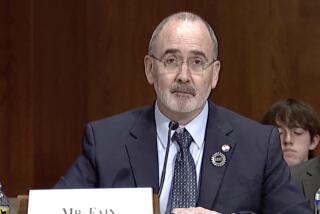Obamacare and the plight of part-time employees
A flurry of news reports, including one Thursday by my colleague Chad Terhune, has documented an unintended consequence of Obamacare: the decision by some employers to keep fewer full-time workers on the payroll or reduce the hours of near full-time workers to avoid having to provide health insurance.
There’s no telling how widespread the practice is, but analysts (including those at the Congressional Budget Office) have been predicting it since before the law was passed. That’s because the act’s mandate to provide insurance falls only on employers that have 50 or more workers putting in at least 30 hours a week. Employers operating near that threshold have a clear incentive to stay on the underside, if doing so improves their bottom lines.
On the plus side, the law -- formally known as the Patient Protection and Affordable Care Act -- created subsidies that will help millions of low- and moderate-income Americans obtain insurance. So the workers whose paychecks are shrinking may find themselves better off next year, when the new federal benefits start flowing.
Yet even supporters of the law have to concede that it’s a problem when companies hire fewer workers or cut their hours. Opponents of Obamacare see a simple solution, namely, repealing it. That’s not going to happen as long as Obama is president. So what else could be done to keep companies from trimming payrolls?
One idea being floated is to make it harder for employers to evade the penalties by reducing the minimum number of employees or hours worked. But that could prompt some employers to cut workers’ hours further, exacerbating the problem.
A better approach is to look at the employment situation broadly. Companies typically offer healthcare benefits when they have to in order to attract the workers they need. The greater the supply of job-seekers, the less that employers have to offer in terms of benefits. The same goes for hours -- the bigger the pool of available workers, the more willing applicants are to accept less than full-time work. For proof, witness how the number of people working part time has jumped since the last recession began.
In that sense, the law’s mandates are kicking in at a bad time. The labor market is flush with job-seekers; in addition to the 11.7 million unemployed in March, 7.6 million people who want full-time jobs are stuck in part-time positions, and 18.7 million more are part-timers by choice. If employers drive away some workers by cutting hours to avoid having to provide health insurance, they can probably find plenty of replacements.
Once the economy returns to full employment, companies won’t have that kind of freedom, and workers who want full-time jobs will have more opportunities to land them. In other words, the cutbacks we’re seeing today may just be a temporary phenomenon that will fade as the economy grows.
That’s cold comfort for the workers whose hours are being cut today, or for the employers trying to figure out whether it makes economic sense to add a 50th employee. Ultimately, the best solution would be to dump employer-provided health insurance in favor of a system that provides the incentives and subsidies directly to individuals.
From an economist’s point of view, employers don’t pay for the health insurance they provide -- their workers do, typically by receiving lower wages and less-generous retirement benefits. The challenge for policymakers is figuring out how to shift away from the current system without providing a windfall to employers at their workers’ expense.
Sen. Ron Wyden (D-Ore.) and a bipartisan group of co-sponsors proposed a way to do that in 2009, but their Healthy Americans Act never got much traction during the healthcare reform debate. It faced too much resistance on both sides of the aisle, with Republicans opposing its requirement that all adult Americans carry insurance and Democrats reluctant to take employers out of the insurance equation. Nevertheless, had Congress gone Wyden’s route, it would have avoided the problems that are bubbling up now for workers whose employers are scrambling to avoid penalties for not providing coverage.
ALSO:
Erasing the stain of Guantanamo
Sen. Ted Cruz, the next Barack Obama?
Kenny Smith schools Chris Broussard on inclusiveness
Follow Jon Healey on Twitter @jcahealey
More to Read
A cure for the common opinion
Get thought-provoking perspectives with our weekly newsletter.
You may occasionally receive promotional content from the Los Angeles Times.







